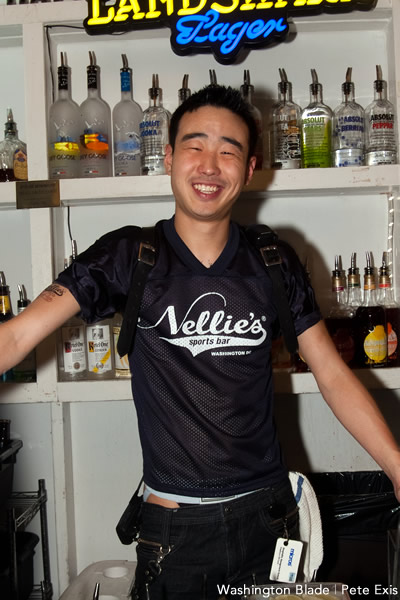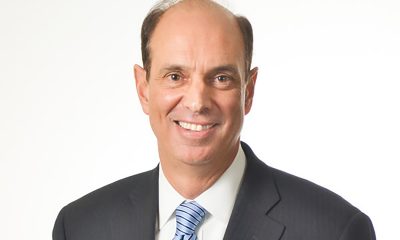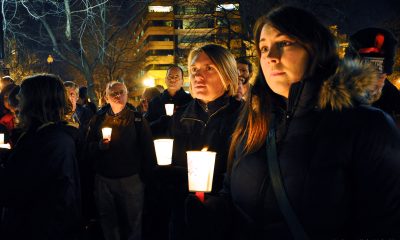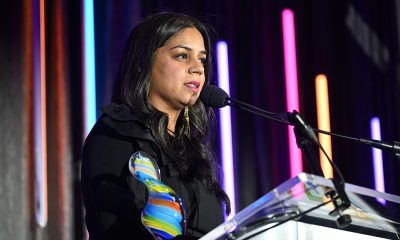Arts & Entertainment
Gone too soon
Teen suicide has received renewed awareness but the issue can affect gays well into adulthood
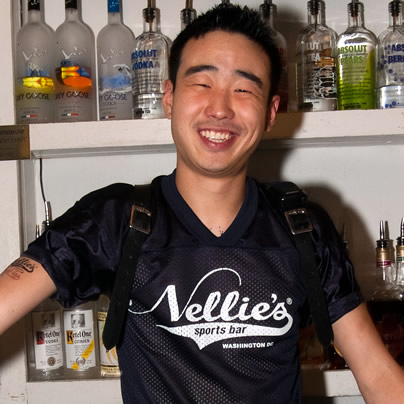
When David Chung took his own life a few weeks ago, his death sent shockwaves through a community that knew him as the smiling Nellie’s bartender. As hundreds gathered at his funeral service, many only wanted to remember the happiness he brought to those around him.
But Chung’s death is a reminder of a serious and often silent illness that has long plagued the LGBT community. According to a 2008 study from the Suicide Prevention Resource Center, lesbian, gay and bisexual youths and young adults are three times more likely to report suicidal ideation (thoughts about suicide) and as high as seven times more likely to have reported attempting suicide. Research in these areas is still limited since mortality data does not report sexual orientation.
And while LGBT teen suicide has gotten a lot of attention in the last two years since a spate of bullying and suicide cases have been reported around the country leading to gay columnist Dan Savage’s “It Gets Better” campaign and renewed awareness of the Trevor Project (thetrevorproject.org), an LGBT youth suicide prevention non-profit, depression and suicide disproportionately affect LGBT people at various ages.
Randy Pumphrey, manager of behavioral health at Whitman-Walker Health, says part of suicide prevention is being able to tell the warning signs. He admits, however, that it is not easy for people not trained in the medical field to differentiate between normal ups and downs and full-blown depression.
“I think it is going to be hard, unless you know the person really well,” he says. “You need to watch for extreme changes in behavior.”
Some of these behavioral changes include not acting the same at work or in social groups, withdrawing from social situations, engaging in more risky activities and verbalizing a death threat or wish.
“A lot of people will make outright allusions to suicide like, ‘I won’t be here anymore,’” says Tamara Pincus, a clinical social worker and therapist. “They may even start to give their possessions away to people, indicating that they are making plans to take their lives.”
Both Pumphrey and Pincus cite the stigma LGBT people face as a big stressor on those already predisposed to depression.
“It might be internalized homophobia,” Pumphrey says. “People who are having trouble identifying as gay or lesbian when they are in a heterosexual marriage or not being able to come out at their job, they might attempt suicide. This feeling of rejection, that can be a really huge thing.”
Mary Lou Wallner, minister at T.E.A.C.H. Ministries, directly understands how rejection can affect a person. Her daughter, Anna, committed suicide in 1997. Wallner says her daughter came out to her in a letter in 1988.
“At the time I was deeply entrenched in a conservative church,” she says. “When she came out, I thought that it was an abomination. I told her so in a letter.”
In the letter, she wrote, “I will never accept that in you. I feel it’s a terrible waste, besides being spiritually and morally wrong … I do and will continue to love you, but I will always hate that.”
Waller says she did not understand that her sexual orientation was not a choice. Nine years went by during which they continued contact but then in 1996, Anna began seeing a therapist who encouraged her to cut off contact with her family. Wallner began collecting cards and money she wanted to give her daughter in a shoebox so when they began speaking she could give them to her. Wallner never got the chance.
“There were probably a ton of warning signs,” she says. “I feel there were clues she was trying to give me. I have many, many regrets.”
Before Anna came out to her mother, she tried slitting her wrists and in another incident, took a whole bottle of aspirin. In hindsight, Wallner says she would have, “gotten in her car and driven to her right away” once she had cut off communication.
Pumphrey says the challenge is not only identifying the warning signs of depression, but also taking action. He says it might be a challenge to speak with someone who is going through this, but in the end it would be worth it.
“What happens in our culture is people are afraid to ask the questions about how a person is thinking and feeling,” he says. “If a person is having suicidal thoughts, they are usually thinking about how they are going to do it. Getting their plan helps you intervene and it may buy you some time.”
If a person seems to be posing an immediate threat to themselves or others, Pumphrey says the person should be taken to an emergency room or 911 should be called. This way he/she can be evaluated and possibly get treatment.
“My prerogative at this time is going to be their safety,” he says. “They may be angry upfront because it feels like a violation, but this is really serious and they might need help.”
Pincus says there are still several challenges facing the LGBT community, especially teenagers and young adults who are really connected to their family. She suggests if families are not supportive of their child’s sexual orientation, that person should seek support outside of their family.
“I think we would like to say that our society is getting past the stigma of LGBT, but we are really not,” she says. Pincus, who came out as bi when she was 16, says that the continual harassment and bullying that occurs in schools and other social venues to LGBT people is a major reason why the suicide rate is higher than for other groups.
“People are still getting beat up for holding hands with their partners and transgender people are getting shot because of their gender identity,” she says.
Since her daughter’s death, Wallner has shared her story with other groups around the country and was featured in the documentary “For the Bible Tells Me So.” She began T.E.A.C.H. Ministries, which stands for “To Educate About the Consequences of Homophobia.” She tries to spread the message of tolerance, not only for the LGBT community, but also for those who may not understand completely.
While she does not discuss scripture with others, she does have a message for other believers.
“It’s not a choice, if it is not a choice it can’t be a sin,” she says.
Books
Love or fear flying you’ll devour ‘Why Fly’
New book chronicles a lifetime obsession with aircraft

‘Why Fly’
By Caroline Paul
c. 2026, Bloomsbury
$27.99/256 pages
Tray table folded up.
Check. Your seat is in the upright position, the airflow above your head is just the way you like it, and you’re ready to go. The flight crew is making final preparations. The lights are off and the plane is backing up. All you need now is “Why Fly” by Caroline Paul, and buckle up.

When she was very young, Paul was “obsessed” with tales of adventure, devouring accounts written by men of their derring-do. The only female adventure-seeker she knew about then was Amelia Earhart; later, she learned of other adventuresome women, including aviatrix Bessie Coleman, and Paul was transfixed.
Time passed; Paul grew up to create a life of adventure all her own.
Then, the year her marriage started to fracture, she switched her obsession from general exploits to flight.
Specifically, Paul loves experimental aircraft, some of which, like her “trike,” can be made from a kit at home. Others, like Woodstock, her beloved yellow gyrocopter, are major purchases that operate under different FAA rules. All flying has rules, she says, even if it seems like it should be as freewheeling as the birds it mimics.
She loves the pre-flight checklist, which is pure anticipation as well as a series of safety measures; if only a relationship had the same ritual. Paul loves her hangar, as a place of comfort and for flight in all senses of the word. She enjoys thinking about historic tales of flying, going back before the Wright Brothers, and including a man who went aloft on a lawn chair via helium-filled weather balloons.
The mere idea that she can fly any time is like a gift to Paul.
She knows a lot of people are terrified of flying, but it’s near totally safe: generally, there’s a one in almost 14 million chance of perishing in a commercial airline disaster – although, to Paul’s embarrassment and her dismay, it’s possible that both the smallest planes and the grandest loves might crash.
If you’re a fan of flying, you know what to do here. If you fear it, pry your fingernails off the armrests, take a deep breath, and head to the shelves. “Why Fly” might help you change your mind.
It’s not just that author Caroline Paul enjoys being airborne, and she tells you. It’s not that she’s honest in her explanations of being in love and being aloft. It’s the meditative aura you’ll get as you’re reading this book that makes it so appealing, despite the sometimes technical information that may flummox you between the Zen-ness. It’s not overwhelming; it mixes well with the history Paul includes, biographies, the science, heartbreak, and exciting tales of adventure and risk, but it’s there. Readers and romantics who love the outdoors, can’t resist a good mountain, and crave activity won’t mind it, though, not at all.
If you own a plane – or want to – you’ll want this book, too. It’s a great waiting-at-the-airport tale, or a tuck-in-your-suitcase-for-later read. Find “Why Fly” and you’ll see that it’s an upright kind of book.
The Blade may receive commissions from qualifying purchases made via this post.
Theater
Out actor Kevin Cahoon on starring role in ‘Chez Joey’
Arena production adapted from Broadway classic ‘Pal Joey’

‘Chez Joey’
Through March 15
Arena Stage
1101 Sixth St., S.W.
Tickets start at $93
Arenastage.org
As Melvin Snyder in the new musical “Chez Joey,” out actor Kevin Cahoon plays a showbiz society columnist who goes by the name Mrs. Knickerbocker. He functions as a sort of liaison between café society and Chicago’s Black jazz scene circa 1940s. It’s a fun part replete with varied insights, music, and dance.
“Chez Joey” is adapted from the Broadway classic “Pal Joey” by Richard Rodgers and Lorenz Hart. It’s inspired by John O’Hara’s stories based on the exploits of a small-time nightclub singer published in The New Yorker.
A warm and humorous man, Cahoon loves his work. At just six, he began his career as a rodeo clown in Houston. He won the Star Search teen division at 13 singing songs like “Some People” from “Gypsy.” He studied theater at New York University and soon after graduating set to work playing sidekicks and comedic roles.
Over the years, Cahoon has played numerous queer parts in stage productions including “Hedwig and the Angry Inch,” “La Cage aux Folles,” “Rocky Horror” as well as Peanut in “Shucked,” and George the keyboardist in “The Wedding Singer,” “a sort of unicorn of its time,” says Cahoon.
Co-directed by Tony Goldwyn and the great Savion Glover, “Chez Joey” is a terrific and fun show filled with loads of talent. Its relevant new book is by Richard Lagravenese.
On a recent Monday off from work, Cahoon shared some thoughts on past and current happenings.
WASHINGTON BLADE: Is there a through line from Kevin, the six-year-old rodeo clown, to who we see now at Arena Stage?
KEVIN CAHOON: Anytime I want to land a joke in a theater piece it goes back to that rodeo clown. It doesn’t matter if it’s Arena’s intimate Kreeger Theatre or the big rodeo at the huge Houston Astrodome.
I was in the middle stadium and there was an announcer — a scene partner really. And we were doing a back and forth in hopes of getting laughs. At that young age I was trying to understand what it takes to get laughs. It’s all about timing. Every line.
BLADE: Originally, your part in “Chez Joey” Melvin was Melba who sings “Zip,” a clever woman reporter’s song. It was sort of a star feature, where they could just pop in a star in the run of “Pal Joey.”
CAHOON: That’s right. And in former versions it was played by Martha Plimpton and before her Elaine Stritch. For “Chez Joey,” we switched gender and storyline.
We attempted to do “Zip” up until two days before we had an audience at Arena. Unexpectedly they cut “Zip” and replaced it with a fun number called “I Like to Recognize the Tune,” a song more connected to the story.
BLADE: Wow. You must be a quick study.
CAHOON: Well, we’re working with a great band.
BLADE: You’ve played a lot of queer parts. Any thoughts on queer representation?
CAHOON: Oh yes, definitely. And I’ve been very lucky that I’ve had the chance to portray these characters and introduce them to the rest of the world. I feel honored.
After originating Edna, the hyena on Broadway in “The Lion King,” I left that to do “Hedwig and the Angry Inch” as standby for John Cameron Mitchell, doing one show a week for him.
Everyone thought I was crazy to leave the biggest musical of our time with a personal contract and getting paid more money that I’d ever made to get $400 a week at the downtown Jane Street Theatre in a dicey neighborhood.
At the time, I really felt like I was with cool kids. I guess I was. And I never regretted it.
BLADE: When you play new parts, do you create new backstories for the role?
CAHOON: Every single time! For Melvin, I suggested a line about chorus boys on Lakeshore Drive.
BLADE: What’s up next for Kevin Cahoon?
CAHOON: I’m about to do the New York Theatre Workshop Gala; I’ve been doing it for nine years in a row. It’s a huge job. I’ll also be producing the “Cats: The Jellicle Ball” opening on Broadway this spring; it’s a queer-centric uptown vogue ball with gay actor André de Shields reprising his role as “Old Deuteronomy.”
BLADE: There’s a huge amount of talent onstage in “Chez Joey.”
CAHOON: There is. I’m sharing a dressing room with Myles Frost who plays Joey. He won accolades for playing Michael Jackson on Broadway. We’ve become great friends. He’s a miracle to watch on stage. And Awa [Sal Secka], a D.C. local, is great. Every night the audience falls head over heels for her. When this show goes to New York, Awa will, no doubt, be a giant star.
BLADE: Do you think “Chez Joey” might be Broadway bound?
CAHOON: I have a good feeling it is. I’ve done shows out of town that have high hopes and pedigree, but don’t necessarily make it. “Chez Joey” is a small production, it’s funny, and audiences seem to love it.

The Capital Pride Alliance held the annual Pride Reveal event at The Schuyler at The Hamilton Hotel on Thursday, Feb. 26. The theme for this year’s Capital Pride was announced: “Exist. Resist. Have the audacity!”
(Washington Blade photos by Michael Key)
























